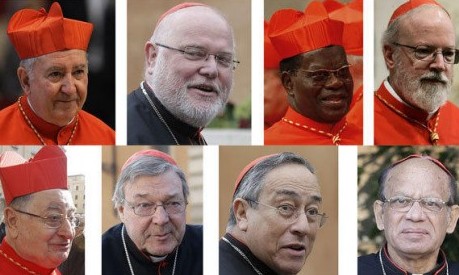When addressing the cardinal conclave, Cardinal Jorge Mario Bergoglio from Buenos Aires warned of “self-preferentiality” and “theological narcissism,” which he said would lead to a “sick” Church. He particularly criticized the “mundane Church that lives within itself, of itself and for itself.”
Six months into his papacy, it is crystal clear that this Argentine cardinal, now Pope Francis, was very serious about what he said.
In his words and his deeds, in what he has done and what he is laying out to do, there is no doubt that the Catholic Church under Pope Francis is facing a game change.
One: Declericalizing the curia
The first and foremost task, of course, is to sweep clean the Roman Curia, which was a mess by the time of Benedict XVI’s resignation. However, imposing change in a decrepit yet conceited governance system is no easy task.
“Things have gone downhill recently, but the Vatican is too big to function without procedures,” one veteran Vatican official said.
The financial shenanigans and corruption have already been made public, but beneath that there have been the equally corrosive effects of careerism and palace intrigue, which have entrenched the governing apparatus of the papal state for centuries.
Yet Pope Francis is tactfully circumventing the old guard by forming his own secretariat, composed of a handful of Argentines and Italians, who work on the second floor of the Santa Marta hostel, the residence of choice ever since his elevation to the papacy in March.
As governed by this papal “mini-curia,” Francis has not only established the eight-cardinal papal council to study the ways and means of curia reform, but he has also set up a group of mainly lay experts to streamline financial and administration procedures. The significance of the latter decision has already been borne out in the murmurings heard among many observers: is this an omen of declericalizing the headquarters of the Catholic Church?
Two: Reshaping the hierarchy
Fifty years after Vatican II, the Church hierarchy is still full of clericalism, thanks to the disproportionate presence of liturgical traditionalists who populated the upper echelons of the Church during the pontificates of John Paul II and Benedict XVI.
Aspirant clergy, who possess the pseudo-vanity mentality of diocesan chancery officials, often post themselves above, rather than among, the people who they purport to represent.
However, Francis made it clear that his ideal bishops are “close to the people…. and also by outward simplicity and austerity of life.” Further, servants of God “should not have the psychology of princes.”
What is absent from Francis’ list of episcopal attributes were “loyalty and orthodoxy,” the two criteria much emphasized by John Paul and Benedict.
It appears that Francis is doing his due diligence in order to pre-empt the tenacious clericalism, and all its bells and whistles, by severing the mythical umbilical cord tied to the divine lineage, which is habitually invoked for the self-serving purposes of many clerics.
In particular, the phrase “should not have the psychology of princes” may be aimed at the cardinals who form the Church’s most elite members, some believe. One of them will one day become the “crown prince” and inherit the throne of the Bishop of Rome but that is no excuse for elitism. Continue reading
Sources
- Dr John C Keng in UCA News
- Image: The Los Angeles Times
Dr. John C Keng is a Canada-based freelance writer on Church and social issues.
